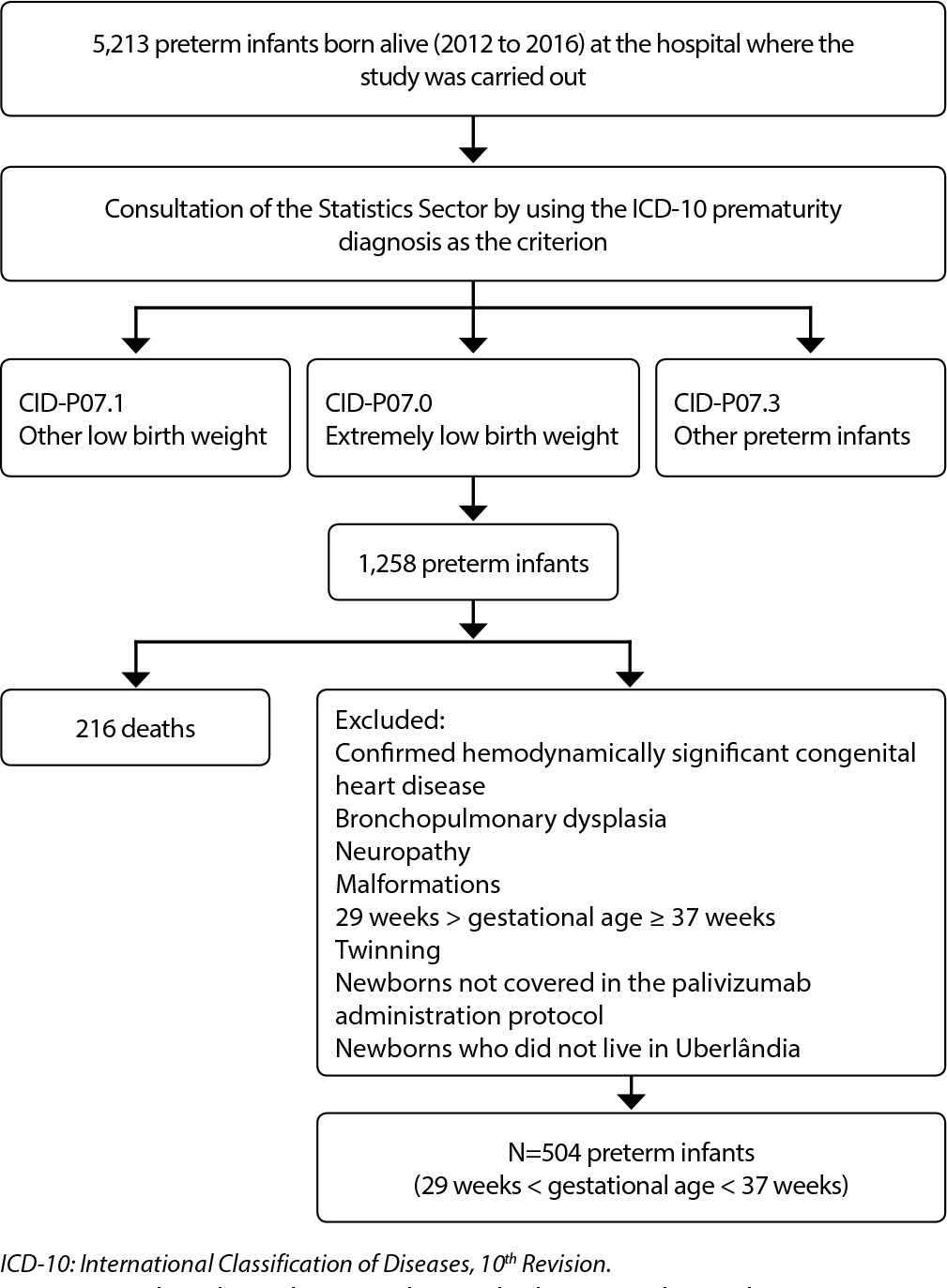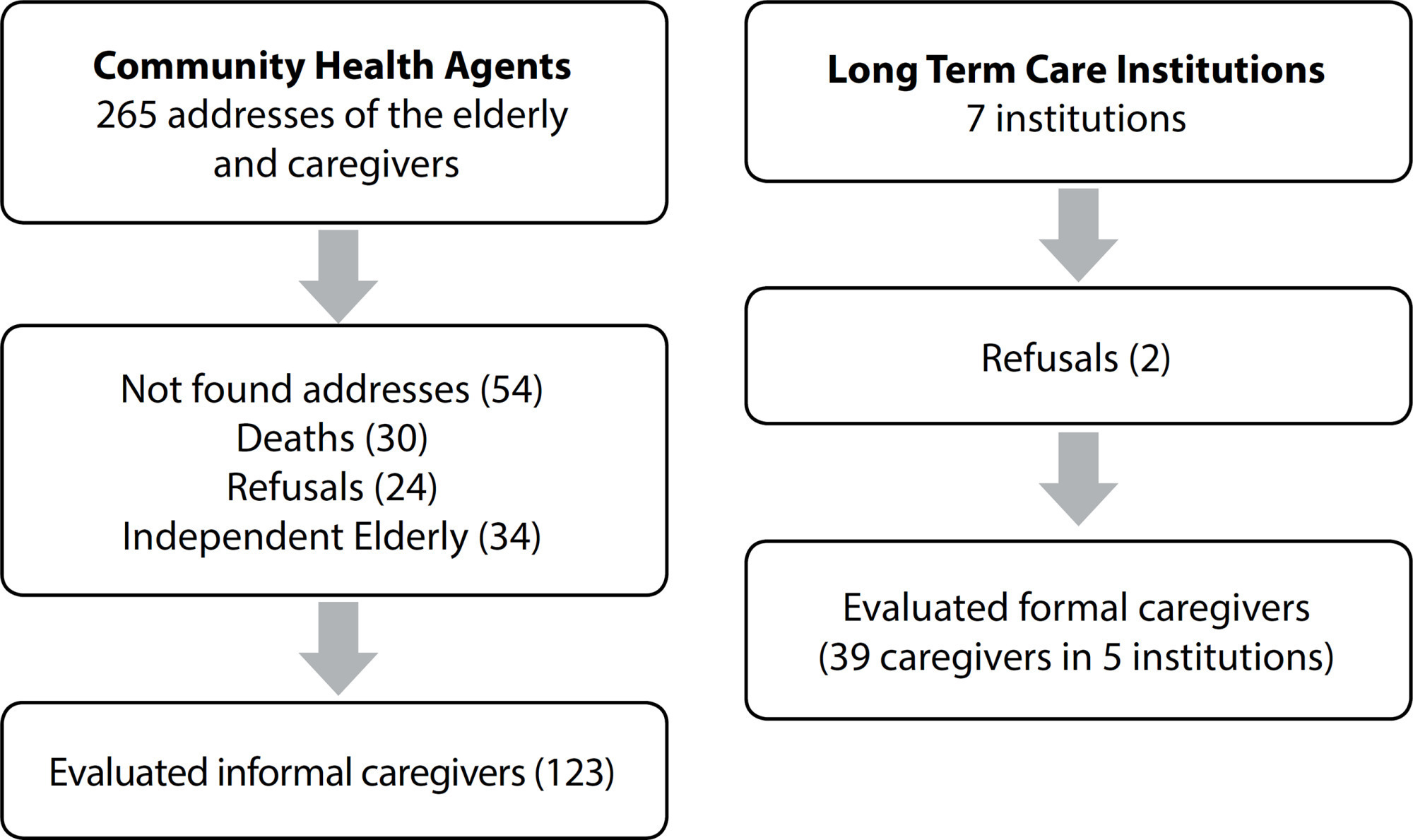-
ORIGINAL ARTICLE10-03-2022
Evaluation of respiratory complications in a cohort of preterm infants who did not receive palivizumab monoclonal antibodies
Revista Brasileira de Enfermagem. 2022;75(6):e20210362
Abstract
ORIGINAL ARTICLEEvaluation of respiratory complications in a cohort of preterm infants who did not receive palivizumab monoclonal antibodies
Revista Brasileira de Enfermagem. 2022;75(6):e20210362
DOI 10.1590/0034-7167-2021-0362
Views0See moreABSTRACT
Objectives:
to analyze the occurrence of respiratory complications over the first year of life in preterm infants who did not receive palivizumab monoclonal antibodies.
Methods:
analytical retrospective cohort study with preterm infants born between 2012 and 2016 in Uberlândia, state of Minas Gerais, Brazil. Data collection occurred from January to November 2018, by consulting hospital and primary healthcare medical records. Data were processed with the Poisson regression model, with p<0.05.
Results:
of a total of 5,213 preterm births, 504 (9.7%) met the inclusion criteria. The preterm infants in this subset were assisted 2,899 times in primary care, which resulted in 1,098 (37.5%) medical diagnoses, of which 803 (78.5%) involved the respiratory tract. Preterm babies fed on formula milk at hospital discharge had more diagnoses of respiratory diseases. Maternal age (p=0.039), respiratory diagnosis at hospital discharge (p=0.028), and number of sporadic appointments (p<0.001) showed a significant association with bronchiolitis; number of sporadic appointments showed a significant association with occurrence of respiratory diseases; and breastfeeding had a protective effect against the development of bronchiolitis.
Conclusions:
preterm infants who did not receive palivizumab showed a high percentage of respiratory diseases, and breastfeeding helped protect them against bronchiolitis. It is recommended that these preterm babies be monitored in primary health care.

-
ORIGINAL ARTICLE10-03-2022
Instrument validity: HIV and other sexually transmitted infections in homeless people
Revista Brasileira de Enfermagem. 2022;75(6):e20210863
Abstract
ORIGINAL ARTICLEInstrument validity: HIV and other sexually transmitted infections in homeless people
Revista Brasileira de Enfermagem. 2022;75(6):e20210863
DOI 10.1590/0034-7167-2021-0863
Views0See moreABSTRACT
Objectives:
to validate, through the Item Response Theory, an instrument on vulnerability to HIV and other sexually transmitted infections in homeless people.
Methods:
a cross-sectional study carried out between February and May 2018 with 100 homeless people in a municipality in northeastern Brazil. A sociodemographic questionnaire was applied, and another with items referring to behaviors vulnerable to HIV and sexually transmitted infections (STIs). Subsequently, it was assessed through the Item Response Theory.
Results:
the items previous diagnosis of STIs (F=0.473), partner with STI symptoms (F=0.518), drug use (F=0.509), sex for money (F=0.552), STI symptoms (F=0.448), number of sexual partners (F=0.616), sharps sharing (F=0.398) and being a victim of sexual violence (F=0.347) were validated.
Conclusions:
the instrument proved to be validated, being able to identify vulnerability to HIV and other sexually transmitted infections in homeless people.

-
ORIGINAL ARTICLE10-03-2022
Good practices in central venous catheter maintenance in time of covid-19: an observational study
Revista Brasileira de Enfermagem. 2022;75(6):e20210397
Abstract
ORIGINAL ARTICLEGood practices in central venous catheter maintenance in time of covid-19: an observational study
Revista Brasileira de Enfermagem. 2022;75(6):e20210397
DOI 10.1590/0034-7167-2021-0397
Views0See moreABSTRACT
Objectives:
to assess adherence to good practices for central venous catheter maintenance by the nursing team during the COVID-19 pandemic.
Methods:
observational, cross-sectional, quantitative research with non-participant observation. Data collection was guided by an instrument developed for this study, consisting of five dimensions. It took place in the intensive care unit of a university hospital in the city of Rio de Janeiro.
Results:
a total of 700 observations were carried out, which resulted, in general, in 402 (57.4%) procedures for adherence to good practices. Hand hygiene (8%) and Performing the dressings (10%) were the dimensions with the lowest adherence.
Conclusions:
good practices for central venous catheter maintenance were partially present in the routine of the nursing team during the COVID-19 pandemic. In critical moments, intensifying the qualification of the teams for a better adaptation to the new work processes is a strategy to sustain the patient safety culture.
-
ORIGINAL ARTICLE10-01-2022
Congenital Zika Virus Syndrome: care in light of the Brazilian Unified Health System principles
Revista Brasileira de Enfermagem. 2022;75(2):e20210146
Abstract
ORIGINAL ARTICLECongenital Zika Virus Syndrome: care in light of the Brazilian Unified Health System principles
Revista Brasileira de Enfermagem. 2022;75(2):e20210146
DOI 10.1590/0034-7167-2021-0146
Views0See moreABSTRACT
Objective:
to know health professionals’ perceptions about care actions provided to children with Congenital Zika Virus Syndrome and their families.
Methods:
this is a qualitative study, carried out in a capital of center-western Brazil, based on the Unified Health System theoretical precepts. Data were collected in September and October 2020, through audio-recorded interviews with 12 health professionals from a specialized service and submitted to analysis of content, thematic modality.
Results:
the implementation of care actions with these children occurs through multidimensional assessment of children and their families, use of the Unique Therapeutic Project, therapeutic interventions for the development of children and the communication and exchange of interprofessional and family experiences, in addition to considering professionals’ prior knowledge and their search for it.
Final considerations:
children with CZS and their families need individualized, frequent, integrated and continuous care.
-
ORIGINAL ARTICLE10-01-2022
Continuity of care for children with special healthcare needs during the COVID-19 pandemic
Revista Brasileira de Enfermagem. 2022;75(2):e20210150
Abstract
ORIGINAL ARTICLEContinuity of care for children with special healthcare needs during the COVID-19 pandemic
Revista Brasileira de Enfermagem. 2022;75(2):e20210150
DOI 10.1590/0034-7167-2021-0150
Views0See moreABSTRACT
Objective:
To describe the continuity of care for children with special healthcare needs during the COVID-19 pandemic through the perception of their caregivers in the Northeast of Brazil.
Methods:
Qualitative descriptive-exploratory research carried out between June and September 2020, in a municipality in the Northeast of Brazil. Eleven caregivers participated through semi-structured interviews conducted at home. The data were submitted to thematic content analysis.
Results:
The social isolation period and the suspension of health services affected the continuity of care, configuring the category “Implications of the COVID-19 pandemic for the continuity of care”. Caregivers expressed fear of children contracting the coronavirus, characterizing the category “Fears and uncertainties of the COVID-19 pandemic in view of the vulnerability of children with special healthcare needs”.
Final considerations:
Caregivers’ reports revealed problems in the continuity of care for the studied cohort. Therefore, health care practices must be rethought in times of pandemic.
-
ORIGINAL ARTICLE10-01-2022
Musculoskeletal symptoms in formal and informal caregivers of elderly people
Revista Brasileira de Enfermagem. 2022;75(2):e20210249
Abstract
ORIGINAL ARTICLEMusculoskeletal symptoms in formal and informal caregivers of elderly people
Revista Brasileira de Enfermagem. 2022;75(2):e20210249
DOI 10.1590/0034-7167-2021-0249
Views0See moreABSTRACT
Objective:
to evaluate musculoskeletal symptoms in formal and informal caregivers of elderly people, and check association with personal and work-related factors.
Methods:
this is a cross-sectional study. Instruments for assessment were the International Physical Activity Questionnaire, Self-Reporting Questionnaire-20, Borg’s effort perception scale and Nordic Musculoskeletal Questionnaire.
Results:
informal caregivers had been working for a longer time (60.2% vs. 41%), had more hours of work (37.4% >12h for day), less time off (85.4% vs. 2.5%) and lack of care guidelines (90.2%). The region with the most musculoskeletal symptoms was the spine and the greater dependence of the elderly, the greater the chances of developing musculoskeletal symptoms (OR= 1.3, 95% CI= 1.1-1.6, p <0.05).
Conclusion:
personal and work-related factors were more prevalent in informal group and the elderly person’s dependence interferes with the increase in musculoskeletal symptoms of caregivers.

-
ORIGINAL ARTICLE10-01-2022
Coping in mental health during social isolation: analysis in light of Hildegard Peplau
Revista Brasileira de Enfermagem. 2022;75(2):e20201207
Abstract
ORIGINAL ARTICLECoping in mental health during social isolation: analysis in light of Hildegard Peplau
Revista Brasileira de Enfermagem. 2022;75(2):e20201207
DOI 10.1590/0034-7167-2020-1207
Views0See moreABSTRACT
Objectives:
to analyze the coping of individuals in social isolation due to suspicion or confirmation of coronavirus infection from the perspective of Hildegard Peplau’s Theory of Interpersonal Relations.
Methods:
this is a qualitative, descriptive research, carried out with 34 individuals in social isolation due to suspicion or confirmation of coronavirus infection who passed through a screening tent of a university hospital in Paraná. Data were collected through semi-structured interviews in June and July 2020. Empirical categories were interpreted by content analysis.
Results:
four categories emerged: Distance; Social and emotional support; Self-awareness and resolution; Learning. These categories established the coping strategies.
Conclusions:
individuals undergoing social isolation are more likely to present problems related to mental health. It was highlighted that coping strategies, motivated by nurses, anchored in Hildegard Peplau’s theoretical framework, promoted the necessary learning for promoting participants’ mental health in the face of a pandemic context.
-
EXPERIENCE REPORT10-01-2022
Actions of a regulatory nurse in the management of surgical waiting lists
Revista Brasileira de Enfermagem. 2022;75(2):e20201233
Abstract
EXPERIENCE REPORTActions of a regulatory nurse in the management of surgical waiting lists
Revista Brasileira de Enfermagem. 2022;75(2):e20201233
DOI 10.1590/0034-7167-2020-1233
Views0See moreABSTRACT
Objectives:
to describe the actions of the regulatory nurse in the management of waiting lines for elective surgeries in a public hospital.
Methods:
this is an experience report about the actions of the regulatory nurse in the management of waiting lines for elective surgeries.
Results:
the results of this initiative were: diminution in waiting times; elimination of discrepancies that led to access inequality; promotion of safer treatments; actions of the nurse as a manager, conducting and mediating situations between services; autonomy from the high management of the hospital with regard to the manager of waiting lists; and effective communication due to a constant feedback with the medical teams.
Final Considerations:
the management of the surgical waiting lists must be continuous and systematic, and it must be broader, to include teams that are not involved yet. This initiative can be replicated and improved in other health organizations.
Search
Search in:
Nuvem de Tags
Enfermagem (930)Cuidados de Enfermagem (269)Atenção Primária à Saúde (239)Idoso (208)Educação em Enfermagem (151)Segurança do Paciente (150)Saúde Mental (145)Educação em Saúde (139)Estudos de Validação (131)Qualidade de Vida (104)Tecnologia Educacional (100)Promoção da Saúde (99)COVID-19 (91)Criança (91)Família (87)Enfermagem Pediátrica (86)Saúde do Trabalhador (86)Adolescente (85)Saúde Pública (82)Estudantes de Enfermagem (77)












